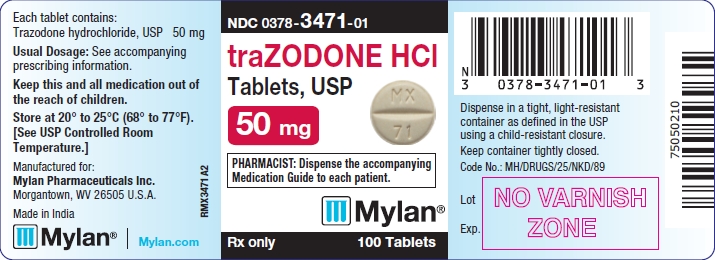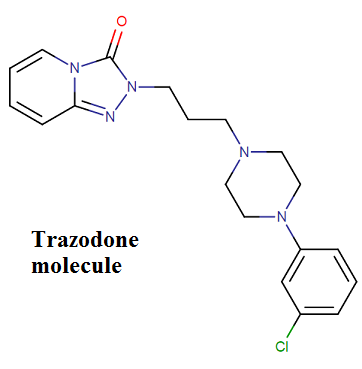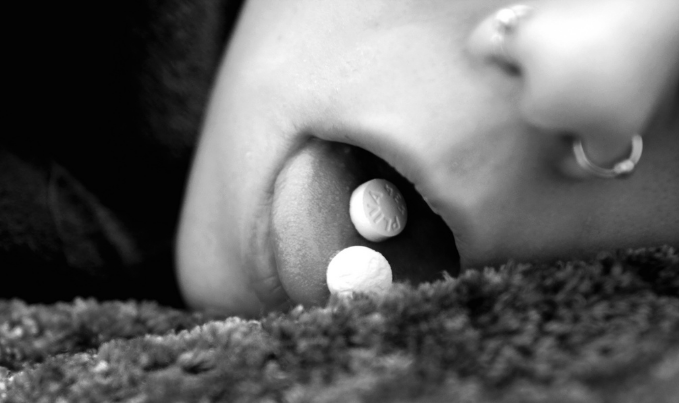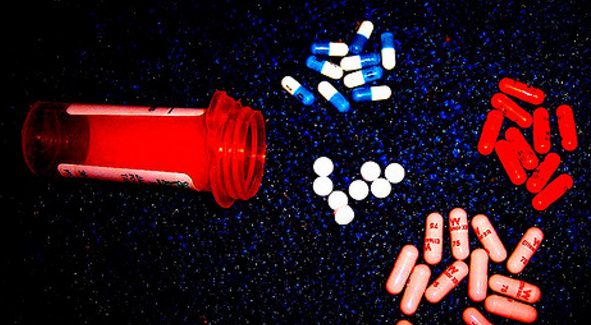Contents
- What is Trazodone?
- What is Trazodone used for?
- How trazodone works in the body?
- Can Trazodone makes you ‘’high’’?
- What studies tell about Trazodone ‘’high’’ potential?
- Trazodone ‘’high’’ experience
- Trazodone addiction
- How to know if I someone is trazodone abuser or addict?
- Who abuses trazodone the most?
- Trazodone withdrawal
- What is trazodone highest dose?
- Trazodone overdose
- How long trazodone stay in your system?
- Does trazodone show up on drug test?
What is Trazodone?
Trazodone is a Generic name for an antidepressant drug that is used to treat symptoms of depression. It belongs to the class of drugs known as serotonin modulators that works by affecting serotonin level in the brain. Trazodone has been shown to be effective for the treatment of major depressive disorders and other types of depressive disorders.
Studies showed that it is very useful in treating depressive disorders linked with insomnia and anxiety. This medicine does not exacerbate psychotic symptoms in patients with schizophrenia or psychosis disorders, thus it can be also used for this treating depressive symptoms in such patients.
This drug is available in the form of immediate-release and extended release oral tablets in doses of 50 mg, 75 mg, 100 mg, 150 mg and 300 mg. Common Brand names for trazodone are: Oleptro, Desyrel, Desyrel Dividose. In 1981, FDA first approved trazodone under the brand name Desyrel.

What is Trazodone used for?
FDA approved (label use) indications for trazodone are:
- Alcohol Dependence
- Anxiety
- Insomnia
- Major Depressive Disorder (MDD)
It is off-labeled used for following disorders:
- Fibromyalgia
- Complex regional pain syndrome
- Control of nightmares
- Panic disorder
- Diabetic neuropathy
- Bulimia nervosa
- Obsessive-compulsive disorder (OCD)
- Alcohol withdrawal
- Schizophrenia as an adjunct to improve negative symptoms
- Erectile dysfunction
How trazodone works in the body?
The exact mechanism of trazodone’s antidepressant action in man is still not fully understood. It is known that trazodone binds to serotonin’s 5-HT2 receptor selectively inhibiting serotonin uptake. At high doses it acts as a serotonin agonist while in low doses it acts as serotonin antagonist. When used for a long-term period, it may also affect postsynaptic neuronal receptor binding sites.
The overall sedative effect of trazodone is probably the result of the blockage of alpha-adrenergic receptors and modest histamine antagonism at H1 receptor. Trazodone dimly blocks presynaptic alpha2-adrenergic receptors and strongly inhibits postsynaptic alpha1 receptors. It has been also shown that trazodone does not affect the reuptake of norepinephrine or dopamine in the brain.

Can Trazodone makes you ‘’high’’?
The FDA has no reported data that trazodone can cause euphoria, which is the experience that most drug-abusers want to achieve. But, since trazodone affects CNS, there is the potential for abuse or dependence similar after taking other antidepressants. While trazodone is not a usual drug of abuse, there have been reports that there are individuals who are using the drug recreationally.
Those who are taking Trazodone to get ‘’high’’ know that it will not give them euphoric high like other abused drugs, but sedative effects of the drug and various other types of cognitive impairment may be achieved.
Also, in order to get ‘’high’’ many drug abusers mix trazodone with alcohol, tranqulizers, or other drugs. Alcohol can increase the effects of trazodone and make them additive.
Trazodone high may be exhibited if it is mixed with any barbiturates, or sedatives (e.g.Valium) but this is definitely not a thing to consider and do. Mixing of these substances can increase the severity and risk of side effects, elevating existing risks of side effects to happen, and making potentially life-threatening situation.
In patients who are suffering from major depressive disorders or other depressive disorders, the regulated and prescribed use of trazodone has been seen in many cases to lift the patient’s mood, and allow them to have normal life functioning.
For unregularly, recreational users of this drug there is very little indication that searching for a ‘’high’’ from this drug works in any way of use or form, indeed at best the crucial need to get sleep and calmed-down is all the vast majority will achieve.
Because trazodone may change the biochemistry of the CNS, it should never be consumed outside doctor prescription and recomendations.
What studies tell about Trazodone ‘’high’’ potential?
2 case-report studies from 1994 documented trazodone co-abuse with Prozac. It is believed to be the first actual documented case of co-abuse of trazodone. Another study from 1999 compared trazodone with Ambien and Halcion.
The results showed that that trazodone had a considerably less potential to be abused than the other two medicines, though, this can also be understood as that trazodone does have some potential to be abuse although it is most likely not commonly a primary drug of abuse.
It can be concluded that trazodone has a mild potential to be abused and for the development of a syndrome of physical dependence that is related with other antidepressant medications.
Trazodone ‘’high’’ experience
There are many reports on the Internet of those who were snorting trazodone in order to get ‘’high’’, indicating these people are taking the drug for nonmedical reasons. If snorted, trazodone will most possibly intensify some of its sedating effects, enhancing its onset of action, and causing a misuse of the medication for nonmedical reasons.
Here are some Trazodones ‘’high’’ experiences described on Erowid website (https://erowid.org/):
Case 1:
“…At about 11pm I crushed a 50mg pill and split it into two lines, I decided to start off small so I snorted one line and saved the second one for later. As I did the first line I was surprised to find that the trazodone was virtually painless going up and gave my head a nice tingling sensation. I waited 15 minutes without noticing any change in perception so I decided to do the second line as well. I sat back down and began to chat online with my girlfriend. After about 45 minutes from taking the first line I noticed that colors became more defined and things began to move in a sort of slow motion. Objects became outlined and everything seemed to stand out. I got up to get a drink of water and my balance was about the same as it would be after getting drunk; I had a very hard time walking straight. At about this time my mood jumped; I became extremely happy and couldn’t stop smiling. An hour after the first line was taken I began to get a pleasant body sensation that is somewhat comparable to a low dose of heroin and my body just pulsed with good feeling. I went to the bathroom to see how I looked and I saw that my eyes were red and my veins were bulging. At that point I checked my pulse and found that my heart was beating a little faster than usual, but nothing fast enough to be concerned about. After that I just sat on the couch very relaxed and watched tv for a while. I drifted off to sleep sometime after and woke up early the next morning feeling well rested and with a lot of energy. My lifted mood was very apparent the next day as well.”

Case 2:
“…I’ve tried several benzodiazepines (clonazepam and alprazolam), and also ambien (zolpidem) and while they usually sedate me in a pleasant way and allow me to get sleep, I find that I usually wake up the next day feeling less than refreshed, and I fear this is due to their negative effects on ‘sleep architecture’. I feel that I’ve been short on deep and satisfying sleep due to near daily stimulant use, so one night I attempted to deepen and enhance my sleep with trazodone 25mg. The drug was taken a half hour before bedtime with a snack (significantly enhances absorption). I was surprised to begin perceiving the effects after about 5 minutes. A heaviness in my limbs and a general feeling of physical satisfaction was noted. My arms and legs felt very good staying put and not moving. As the drug wore in I also noticed a bit of physical clumsiness and a tiny amount of mental slowness and disorientiation, which was a welcome change of pace from the frenetic daytime life of stimulants. I proceeded to go to bed 30 minutes after dosing. Lying in bed I felt like I could be comfortable not moving for hours – something I rarely if ever feel. I didn’t fall asleep straight away because I wasn’t used to the sort of spaced-out headspace that the trazodone was putting me in, but due to the fact that it removed all anxiety and because I was so physically comfortable, I enjoyed lying in bed for about a half hour until I fell asleep. My sleep was definitely enhanced. I woke up fewer times and fell back to sleep when I did wake. My body wasnt nearly as restless as it normally would be, and my dreams were intensely vivid and memorable. The next morning I felt the ‘trazodone hangover’ which consisted of continuing body buzz from the night before, and a bit of grogginess and physical slowness. The negative effects disappeared by lunchtime, however, but the great feeling of physical refreshedness persisted!! Trazodone provides me with a near constant physical ‘refreshed’ feeling of being comfortable in my body. Whether this is due to refreshing sleep or the effects of the drug I do not know. Either way I feel very healthy now and like my sleep has been restored. One side effect of using trazodone is that I feel a bit more carefree and have less anxiety than normal. I also do not know whether this is coming from the drug itself (25mg is a very small dose, however) or from the fact that I always feel refreshed and ready to go in the mornings. Trazodone is one of the safest sleep aids (in terms of dependency) and seems to be one of the most beneficial in terms of effects on sleep architecture and mood. I’d highly recommend it to people who feel like they cant get enough deep sleep or who deal with restless leg or middle of the night awakenings. Dont take too much – I believe if I had tried 100mg or above the disorientation and strange feeling would have been severe. “
Trazodone addiction
Any patients who use antidepressant drugs such as trazodone for a period of longer than 6-8 weeks may possibly develop a physical dependence on this drug. It is important to know that physical dependence does not necessarily indicate abuse or addiction.
Patients who take trazodone or same medications strictly for medicinal indication, in recommendable doses under their doctor supervision may develop a physical dependence, but they are not addicted and not considered as abusers them rendering to the formal clinical criteria for addiction and abuse as presented by the American Psychiatric Association.
According to the definition, addiction and abuse require the nonmedical (no-diagnosed) use of drugs that result in a number of negative events for the individual and lead to stress or functional impairments.
How to know if I someone is trazodone abuser or addict?
Signs that certain individual is abusing or become addictive to trazodone include:
- The person has no indication for trazodone use and takes trazodone without a prescription.
- A person has prescription for trazodone but it uses the drug more often or in higher doses than recommended or in the way the drug is not recommended to be taken such as snorting or he/she combines trazodone with other drugs or alcohol.
- A person with a prescription tries to get more trazodone than initially prescribed by doctor, shopping, buying it illegally, stealing etc…
- The person starts to spend more time thinking about the drug and attempting to get trazodone.
- The person remains to take trazodone no matter its usage leads to negative events, such as problems at work, relationships or school issues, etc.
- The person starts to ignore his/her major obligations at work, school, as parent etc., as a result of trazodone abuse
- Trazodone abuser begins to have health issues.
- Even he/she knows that drug can cause serious problems, abuser continue drug administration and even starts combining it with other drugs.
- The person feels pleasure while taking trazodone
- Person feels that needs higher doses in order to obtain same effects. This is known as drug tolerance
- After drug discontinuation, the person begins to demonstrate issues with withdrawal symptoms when going without the drug
Who abuses trazodone the most?
According to the National Institute of Drug Abuse and numerous scholarly sources about addiction and abuse, trazodone and similar-drug abusers are most likely:
- Pepople who take prescription medications for nonmedical reasons. They often combine trazodone with other drugs or alcohol.
- Antidepressant medication abuse usually occur secondary mixed with other drugs of abuse as opposed to being a primary drug of abuse. Also, individuals who abuse trazodone are far more likely to also have histories of abusing other drugs or addiction to other drugs of abuse.

Trazodone withdrawal
Like any other drug that has effects on the brain, after abrupt discontinuation of trazodone, withdrawal symptoms may occur. Even though manufacturers do not warn about this potential of causing withdrawal symptoms, it can occur specifically in patients taking higher doses of trazodone for long-term period.
Withdrawal symptoms may also occur after patient’s non-compliance with the treatment regimen, particularly when doses of trazodone were missed for several days. Some patients may find these symptoms as a good reminder that they have missed some trazodone doses whereas others may experience intense advrse events and permanently stop taking the medication.
Abrupt discontinuation of trazodone, may lead to the following withdrawal symptoms:
- Agitation
- Anxiety
- Confusion
- Dizziness
- Headache
- Insomnia
- Irritability
Usually, these withdrawal symptoms are not too intensive and long-term, thus they medical attention is not required. However, in some rare cases it is possible for patients to develop condition called severe discontinuation syndrome that can last for several weeks and cause significant side effects. Severe emotional or psychological disturbance are considered as more dangerous symptoms of trazodone withdrawal.
Patients who are exhibiting such extreme issues may need admission into a medical facility to manage the withdrawal and to prevent possible harm. Some patients may develop withdrawal symptoms such as mood swings, aggression and irritability. These symptoms may compromise the patient’s safety.
Those who are taking trazodone as a sleep aid, abrupt discontinuation can lead to an insomnia recurrence or even worsen the condition.
Patients should never discontinue trazodone on their own, without consulting their doctor first. Generally, doctor recommends that patients slowly stop off the drug, tapering the dose and frequency to a lower rate, before finally discontinuing it. There are some reports of patients experiencing withdrawal symptoms after gradually tapering off the drug.
What is trazodone highest dose?
The recommended adult dosage for trazodone is 150 mg once a day. The dosage may be increased by 50 mg every 4 or 3 days. The maximum allowable daily dose should not exceed 400 mg for outpatients, while hospitalized patients may take up to 600 mg daily. Pediatric dose is 25 to 50 mg per day and it can be increased to up to 150 mg daily. Any excessive intake beyond the maximum dosage may lead to an overdose.
Trazodone overdose
Trazodone overdose usually hits neurologic, respiratory, cardiovascular and gastrointestinal system. Trazodone overdose symptoms may include:
- Vomiting. Trazodone affects GIT, thus vomiting and nausea may be caused
- Drowsiness. Due to antihistamine effects trazodone may cause CNS depression. In overdose situations drowsiness will be potentiated and may lead to further alteration of the mental status. Severe Trazodone overdose may lead to a coma.
- Priapism. This condition is known as prolonged penile erection even in the situations without sexual stimulation. It is a result of the trazodone’s antagonistic on the alpha adrenergic receptors that cause blood vessels vasodilatation. The prolonged vasodilatation increases blood flow leading to persistent erection. Priapism is usually painful and is considered as emergency conditions because of possible ischemia to the tissues. Similar occurrence may also occur in the clitoris of female patients.
- Arrhythmias. Trazodone overdose may provoke arrhythmias, because in higher doses traozodne binds to the beta adrenergic receptors. The most common type of arrhythmias caused by trazodone overdose is premature ventricular contractions.
- CNS depression. Trazodone overdose may also lead to respiratory depression. Shortness of breath and decreased respiratory rate are usually the first signals of respiratory depression.
- Seizures. Increased brain activity that may provoke seizure attacks may be also experienced with Trazodone overdose.
- Decreased white blood cell counts. Trazodone may also have the effects of decreasing the white blood cell count leading to possible infections.
- Death. Death may occur from respiratory and CNS depression as well as cardiac failures.
How long trazodone stay in your system?
The elimination half-life time of Trazodone is estimated within the range of 5-9 hours. So, after discontinuation it’ll take around 7.3 hours to eliminate half of the dose from your body. To completely eliminate Trazodone from your system, it’ll take an average of 1.67 days.
After ingestion trazodone is metabolized to the primary metabolite known as “m-chlorophenylpiperazine” which has an elimination half-life of 2.4 to 6.8 hours. However, other metabolites of Trazodone have been shown to have an elimination half-life time of up to 13 hours.
Although trazodone will be excreted during 2 days, elimination of different metabolites could take nearly 3 days. Different factors may have an impact on complete excretion of trazodone metabolites; thus is unlikely to exceed 4 days.
Different factors may influence how long trazodone will stay in your system. These factors include: age, body mass, genetics, metabolic rate, liver function, co-administration of food or drugs, urinary pH, dosage and frequency of use.
Does trazodone show up on drug test?
Trazodone is not considered as controlled substance, thus you won’t be tested on its present, and routine/home standard drug tests can’t confirm trazodone presence. However, it is true that trazodone may give false positive results due to chemical similarity with controlled-substances.
A metabolite of trazodone called meta-chlorophenylpiperazine, can rarely cause false positive test results on drug screens for ecstasy and other amphetamines. This false positive result can happen especially at an initial drug screening.
However, if this happens, doctors are going to perform another more advanced and precise test in order to confirm this positive result. This second test is used to check fully for Trazodone. So, if you haven’t taken illegal or any other controlled drugs, you should not worry about anything. The test administrator will confirm your drug test is clean.
Due to structural similarity to some benzodiazepines it is debatable whether trazodone may cause false positive results on benzos. According to many experts Trazodone will not generally give a false positive of Benzodiazepines.
“How many mg of cyclobenzaprine to overdose and die?“
“What happens when you take too much Ambien?“
